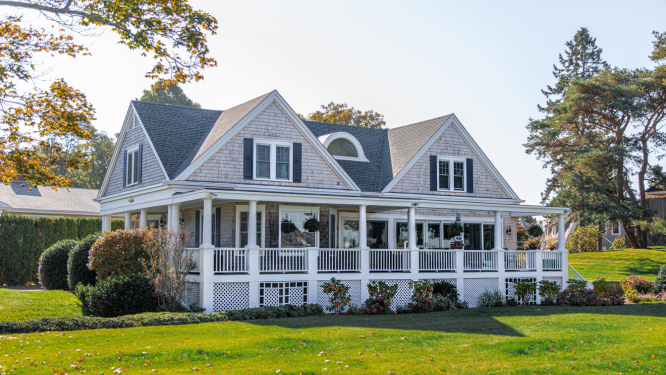How to Identify Different Types of Real Estate
Types of Real estate encompasses many property types that all serve a specific function and present unique investment opportunities. Homes provide housing to families, while commercial buildings support industries and economic activity creating a dynamic real estate market full of possibilities and variety. Understanding different types of real estate investments extravagant estates, functional rental homes, or industrial properties is integral for making informed choices. Real estate investment options range from single-family residences to managing huge commercial complexes each has different economic trends, yields, and risks attached. This guide details some of the main types of available real estate and insights into their advantages and characteristics.
Residential Real Estate
Single-Family Homes
Single-family homes are located within residential real estate developments and provide shelter to one family unit at a time. These detached residences provide more private space. Individuals highly desire places that offer independence from outside influences and ensure privacy for them.
Multi-Family Houses
Multiple-family houses consist of duplexes, fourplexes, and triplexes, which contain several households and can be considered one building; such properties provide potential rental income.
Condominiums
Condos are individual units within an overall complex that share amenities and common spaces among its tenants. Each owner enjoys their own space but may share amenities or spaces with fellow tenants in common spaces or amenities shared among tenants in a complex.
Townhouses
Townhouses are homes consisting of multiple stories connected by shared walls. They offer both community and private living, as well as shared facilities and spaces.
Commercial Real Estate: Types of Real Estate
Office Buildings
Office buildings are structures used to conduct business activities. They range from skyscrapers with high rises to smaller properties designed for various companies.
Retail Properties
Retail spaces provide locations where people can sell products and services. Such spaces may include shopping centers, strip malls, or standalone retail stores.
Industrial Real Estate
This sector encompasses manufacturing, warehouses, and distribution properties, such as manufacturing facilities, distribution centers, and parks.
Mixed-Use Properties
These buildings combine residential, commercial, and industrial space into one development for maximum community vitality. Their many uses contribute significantly to strengthening communities as a whole.
Industrial Real Estate: Types of Real Estate
Warehouses
Warehouses are ample storage facilities used for inventory control and distribution – an integral component of supply chain management.
Distribution Centers
Distribution centers are facilities specifically created to transport products to retail stores or directly to consumers. They employ advanced technologies and logistics systems for efficient distribution.
Flex Spaces
Flex spaces are properties designed for flexibility that can be transformed to serve different uses, including warehouses, office space, or light manufacturing operations. Such flexible properties can easily adapt to changing business needs by accommodating their adaptable properties as needed.
Agricultural Real Estate
Farmland
The term farmland refers to land used both for cultivating crops and raising animals, including fields for crop production and pastures where livestock may graze freely.
Ranches
Ranchers dedicate expansive properties to raising livestock for farming or ranching production purposes. They often include associated agricultural production on smaller or vast properties. Ranches may range in size from small farms to vast estates.
Orchards and Vineyards: Types of Real Estate
Orchards and vineyards are farms that cultivate fruit, nuts, or grapes to produce wine.
Timberlands
Forested areas are used by timberland owners for producing commercial-grade wood and implementing sustainable forest management practices. Timberland plays an essential part in lumber production industries and forest sustainability management practices.
Special-Purpose Real Estate
Hospitality Properties
For those searching for hospitality properties, motels, resorts, and hotels come to mind first. They all serve a similar function of hosting guests while also providing various amenities and services for them to enjoy during their stay.
Health Facilities
Healthcare facilities consist of hospitals, nursing homes, clinics, and medical centers that offer additional healthcare treatment and assistance services.
Educational Properties
Educational properties comprise schools, colleges, and universities that exist solely to serve academic needs; some can include residential spaces.
Religious Properties
Religious properties include synagogues, churches, mosques, and other similar buildings used for ceremonies of worship and community gatherings.
Land Real Estate
Vacant Land
A vacant property offers potential for future investments, such as building new structures or investing in real estate.
Development Land in Types of Real Estate
Land designated for development or construction typically requires approvals related to zoning and planning processes before its use can begin.
Agriculture Land in Types of Real Estate
Land used for agriculture includes pastureland, cropland, and other land utilized to cultivate farms or conduct cattle ranching operations.
Timberland in Types of Real Estate
Land set aside specifically to cultivate and harvest wood for use within the forest industry and ensure. Sustainable resource management is used to support sustainable forest practices and industry needs.
Luxury Real Estate: Types of Real Estate
High-End Residential Properties
Luxury residential homes include estates, houses, penthouses, and estates that stand out with premium amenities and market values that surpass what other properties can provide. These luxury residences can range from estates and house penthouses to estates that feature estate living features for maximum living pleasure and high market values in terms of location value and amenities offered.
Luxury Condominiums of Types of Real Estate
Luxurious condominiums are properties located within luxurious buildings that boast top-of-the-line features and amenities and prime locations.
Vacation Homes
Luxury vacation homes provide luxurious housing used explicitly for relaxation or recreation in desirable vacation destinations.
Private Islands in Types of Real Estate
Private islands provide their inhabitants with total privacy and unique life experiences—the pinnacle of luxurious real estate properties.
Rental Properties
Rental properties, including commercial and residential real estate, can be acquired for the sole purpose of earning revenue by subleasing to tenants.
Real Estate Investment Trusts (REITs)
REITs are businesses that own income-producing real property and manage, operate, or provide funding. Investing in REITs allows you to participate in the real estate market without directly dealing with property owners.
Vacation Rentals in Types of Real Estate
Vacation rentals are used primarily in touristic areas for short-term rental periods. They provide income via rental fees and could then form part of an investor portfolio.
Flipping Properties
Property flipping refers to purchasing renovations or selling homes at a profit to earn an investment return. It requires market knowledge, remodeling skills, and capital investments for success.
Knowledge of different kinds of properties is invaluable when navigating the real estate marketplace, whether for selling, purchasing, or investing. Each property types of real estate comes with its own set of opportunities and challenges. So remember this when making decisions regarding real estate purchases or sales.
Conclusion
Real estate types offer many opportunities, each offering distinct benefits and considerations. Are You Drawn to Residential, Commercial, and Luxury Real Estate Investment Opportunities? Recognizing their differences is critical to successful investing. Every types of real estate offers distinct opportunities and risks when investing, requiring careful examination to find one that matches your investment goals and risk tolerance. By carefully exploring various categories of Types of Real Estate. You may discover more suitable investments to meet both of them. Making informed real estate decisions requires knowledge types of real estate properties available on the market and their specific characteristics since their ever-evolving nature means that remaining up-to-date can help manage potential opportunities and risks effectively.




Post Comment